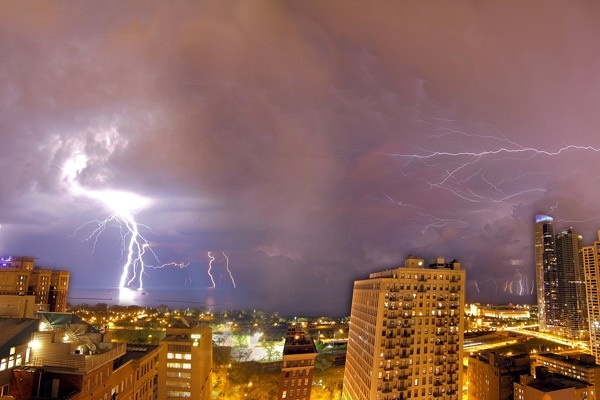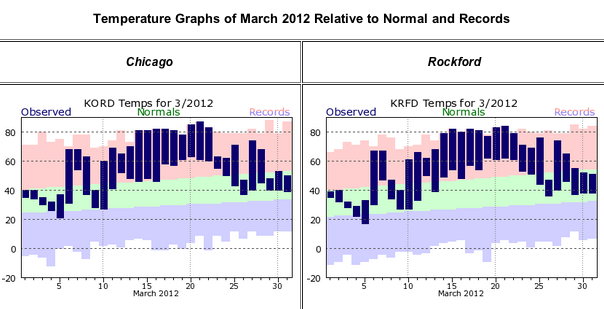
It's the season of best-of lists, in which we look at the most interesting things that people are interested in, like our list of Ten Home-Grown [Theater] Productions that Wowed Us. I may be a philistine, but for me the best best-of list so far is the Top Ten Weather Events for Northern Illinois and Northwest Indiana for 2012 (PDF) by Jim Allsopp, Warning Coordination Meteorologist for the National Weather Service. It's Chicago; the weather is at least as influential, entertaining, and of interest as the theater.
And… this year it's a bit of a dud, unless you like things hot and dry. Some highlights:
* First, our warm winter: "After four consecutive 50 inch snow seasons, Chicago had only 19.8 inches for the 2011-2012 winter season. It was the 10th least snowy season on record. The average temperature for the winter months of December through February was 32.8F, which was 6.4 degrees above the normal of 26.4F. It was the ninth warmest winter of all time….
"In addition, the temperature never went to 0F or below at Chicago. The coldest temperature was 5F on three dates in January. There have only been nine other winters in Chicago history without a temperature of 0F or colder. Rockford had a low temperature of 0F on two dates in January, but the temperature never dipped below zero, a first for Rockford."
[And it's not looking good, or bad, for the last few days of the year.]
* Then, our warm March, which was really freakishly warm: "The stretch of incredible warmth from March 14 through March 22 was probably the most anomalous weather event of any kind over northern Illinois and northwest Indiana in several decades, rivaling the incredible Rockford heat wave of July 1936 or the Chicago heat wave of late August-early September 1953. Here are some of the statistics:
"The average March temperature in Chicago was 53.5F, which was 15.6 degrees above normal and almost 5 degrees warmer than the warmest March ever! … In the previous 140 years only ten 80 degree temperatures were ever recorded in Chicago in March. There were eight days with temperatures in the 80s in March 2012. Chicago broke or tied daily high temperature records on nine consecutive days. This was the second longest stretch of standing daily temperature records of any type for Chicago dating back to 1871."

* Then the rest of the spring: "Chicago experienced its warmest spring ever with an average temperature of 56.6F, which was 8 degrees above the normal of 48.6F. Record highs of 97 and 95 were recorded on May 27 and 28, respectively. It was the warmest ever so early in the year. There were 26 days in spring 2012 with a maximum temperature of 80 or greater, second only to 28 days in the spring of 1977."
* And the summer: "In Chicago, the average June temperature was 74.0F which was 5.1 degrees above normal, and the sixth warmest June ever. The temperature hit 100 on June 28, the first 100 degree day in Chicago since 2005. There was only 0.90 inches of rain, which was 2.55 inches below normal, making it the fifth driest June on record. This was followed by the third hottest July ever. The average temperature for July was 81.1F, which was 7.1 degrees above normal. By the end of July, Chicago had reached 90 degrees or greater 35 times, surpassing the 32 days of 90 degree weather in the record setting year of 1988. Every day in the month of July was at least 80 degrees and every day’s average temperature was normal or above normal….
"The most intense heat wave of the summer occurred July 4 through 6. Highs in Chicago were 102, 103, and 103 – all records. It was the second warmest 3 day period in history and only the third time ever that Chicago hit 100 degrees for three straight days."
* And more warmth: "The high temperatures in Chicago December 1 through 4 were 59, 63, 70 and 59. The 70 degree high on December 3 was one short of the record for the date and month. The record of 71 was set in 1970. The other 71 degree December reading occurred on December 2, 1982. It was only the third 70 degree reading ever in the month of December and only one of six 70 degree days ever recorded during the winter months of December, January, and February….
"No measurable snow fell through December 19 at Chicago or Rockford. At Chicago and Rockford, a record was set for the longest period without measurable snow, 290 days. The old record for Chicago was 280 days set in 1994. The record at Rockford was 287 days set in 1922. It was also the latest in the season without measurable snow for Chicago. The previous record was December 16."
Beyond that, there's not a lot of note, except for one detail of that one really windy storm in October, when Hurricane Sandy created perfect conditions for massive waves on Lake Michigan: "Winds gusted to 69 mph at Michigan City, 60 mph at Gary Airport, 58 mph at Chicago’s Harrison-Dever Crib, and 56 mph at the southern Lake Michigan buoy. The strong and persistent north winds caused waves to build to 21.7 feet at the buoy. This was the second largest peak wave ever recorded in the buoy’s 31 year existence."
For all the lack of havoc, I didn't see anything they missed, except for one thing that's a bit out of their purview: the highest mold count in Chicago history, set this August.
Photograph: vonderauvisuals (CC by 2.0)


